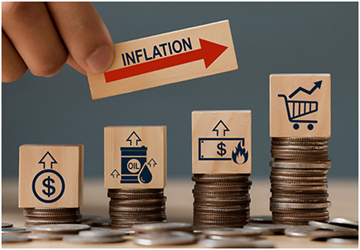As the great philosopher and economist Karl Marx once said, "Interest in the capital is merely the disguised form in which the profit earned by the capitalist appears." And boy, was he right! Rising interest rates can significantly impact the stock market, affecting everything from investor confidence to consumer spending. Investors and businesses alike must keep a close eye on interest rate trends, as they can signal broader economic changes and impact everything from the price of goods to the availability of credit. Interest rates are a fundamental aspect of capitalism and can reveal much about the underlying dynamics of our economic system. Simply put, it is the yardstick for measuring the economy's performance.

What causes rising interest rates?
Several factors can cause rising interest rates. One of the main drivers of rising interest rates is inflation. Central banks may raise interest rates to curb inflationary pressures and maintain price stability when inflation is high. Another factor that can cause rising interest rates is increased demand for credit. When demand for credit is high, lenders may raise interest rates to limit the amount of borrowing and manage their risk.
Changes in monetary policy, such as tightening by central banks, can also lead to rising interest rates. Higher interest rates can help to cool down an overheating economy and prevent inflation from spiraling out of control. Global economic factors can also impact interest rates. For example, if a major economy experiences a recession or financial crisis could lead to a flight to safety, causing investors to buy bonds and push interest rates higher.
In this article, we will explore the ten implications of rising interest rates on the stock market, from inflation to bond yields and everything in between.

Inflation
Rising interest rates are often used to combat inflation, as they can help slow down the economy and prevent prices from rising too quickly. However, the relationship between interest rates and inflation is not always straightforward, and rising rates can have unintended consequences.
For example, when borrowing costs increase, consumer spending tends to decrease. This can lead to lower earnings for companies, which can cause stock prices to fall. This can create a vicious cycle, as falling stock prices can further dampen consumer confidence and spending, leading to a further decline in earnings.
Bond Yields
Bond prices tend to fall when interest rates rise, leading to higher yields for investors. This can create a dilemma for investors seeking safe, predictable returns. On the one hand, rising yields on bonds can be attractive as they offer a better return on investment.
Sectors such as utilities and real estate, known for their high dividend yields, are greatly affected by rising interest rates on bond yields. These sectors can be especially sensitive to changes in interest rates, as investors may be more likely to choose fixed-income investments over these stocks when interest rates rise.
Corporate Profits
We all know that borrowing money costs money, but did you know that rising interest rates can also impact corporate profits? When companies have to spend more money on borrowing costs, they have less money to invest in their businesses, leading to lower earnings potential and lower stock prices. It's a classic case of "you gotta spend money to make money," except in this case, you're spending more money just to keep the status quo.
Real Estate
You may think rising interest rates would be a boon for the real estate market but think again. Higher interest rates mean higher mortgage rates, which can lead to fewer homebuyers and ultimately lower demand for housing. And when demand for housing drops, so do home prices, which can have a ripple effect on the stock market. It's like the butterfly effect, but with mortgages.
Foreign Exchange
The value of currencies in foreign exchange markets is impacted by rising interest rates. When interest rates rise, the value of a currency tends to rise as well, making exports more expensive and imports cheaper. This can significantly impact multinational companies, whose stock prices may fluctuate based on changes in foreign exchange rates.
Government Debt
Rising interest rates can also impact government debt, as higher interest rates mean higher government borrowing costs. This can lead to higher deficits, higher inflation, and lower stock prices. It's a vicious cycle that can be hard to break.
Credit Card Debt
As interest rates rise, so do credit card interest rates, leading to higher monthly payments and less disposable income. And when consumers have less disposable income, they tend to spend less, which can impact the stock market as a whole.
Dividends
When interest rates rise, the value of dividend-paying stocks tends to fall. Investors can earn higher bond yields, making dividend-paying stocks less attractive. And when dividend-paying stocks lose their allure, their prices drop, leading to lower overall stock prices.
Central Bank Policies
Central banks' policies can significantly impact the stock market. When central banks raise interest rates, it can signal to investors that the economy is overheating, leading to lower stock prices. On the other hand, when central banks lower interest rates, it can stimulate economic growth and lead to higher stock prices. It's like a game of musical chairs but with interest rates.
Investor Sentiment
Last but not least, rising interest rates can impact investor sentiment. Investors may become more risk-averse as interest rates rise, preferring safer investments like bonds over riskier stocks. This can lead to a sell-off in the stock market and lower stock prices overall. It's like the old saying: when the going gets tough, the tough get going...to bonds.
Conclusion
We've covered a lot of ground regarding the implications of rising interest rates on the stock market. Many factors are at play, from the impact on borrowing costs to the effects on economic growth.
But you should note that rising interest rates are not necessarily bad for the stock market. While they can lead to short-term volatility and a shift in investor sentiment, they can also signify a healthy, growing economy.
Ultimately, it's up to investors to weigh the risks and rewards of investing in the stock market during rising interest rates. Diversification and a long-term investment strategy are key to weathering any market fluctuations.


